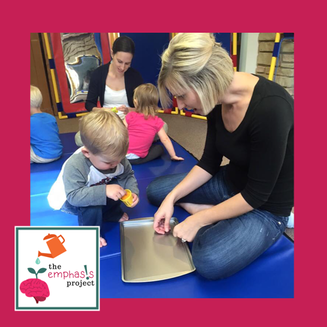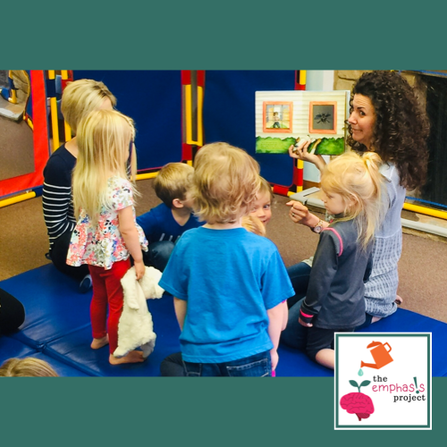Caregiver Coaching: An Evidence-Based Model

From the University of Washington's November 2018 findings titled "Parents learn, babies talk: How coaching moms and dads improves infants' language skills":
"Most parents know that the amount of language their child hears is important. What we shared with them through coaching is that how they talk to their baby may matter even more," said Naja Ferjan Ramírez, a research scientist at I-LABS and lead author of the study. "We explained to them the research behind parentese, and made sure they were aware of the connection between their language input, and their speaking style in particular, and their baby's language outcomes."
The researchers found that babies of coached families babbled, on average, in 43 percent of the analyzed recordings, while control babies babbled in 30 percent of the recordings. In addition, at 14 months, intervention babies produced significantly more words than control babies, as measured by the recordings as well as parent reports."
"Most parents know that the amount of language their child hears is important. What we shared with them through coaching is that how they talk to their baby may matter even more," said Naja Ferjan Ramírez, a research scientist at I-LABS and lead author of the study. "We explained to them the research behind parentese, and made sure they were aware of the connection between their language input, and their speaking style in particular, and their baby's language outcomes."
The researchers found that babies of coached families babbled, on average, in 43 percent of the analyzed recordings, while control babies babbled in 30 percent of the recordings. In addition, at 14 months, intervention babies produced significantly more words than control babies, as measured by the recordings as well as parent reports."
Auditory-Verbal Therapy: An Evidence-Based Model
From Otology & Neurology Volume 20, No. 10, 2019: Communication Mode and Speech and Language Outcomes of Young Cochlear Implant Recipients: A Comparison of Auditory-Verbal, Oral Communication, and Total Communication:
"Results: All groups showed improvements over time. Linear mixed model analyses indicated scores obtained by children in the AV group were significantly higher than mean scores obtained by children in the other groups on most test measures at most post-implant intervals. Significantly greater numbers of children in the AV group obtained standard scores within normal limits than children in the OC and TC groups.
Conclusions: These findings support the use of the auditory- verbal communication approach to facilitate development of age-appropriate speech and language and literacy skills in profoundly deaf children.
"Results: All groups showed improvements over time. Linear mixed model analyses indicated scores obtained by children in the AV group were significantly higher than mean scores obtained by children in the other groups on most test measures at most post-implant intervals. Significantly greater numbers of children in the AV group obtained standard scores within normal limits than children in the OC and TC groups.
Conclusions: These findings support the use of the auditory- verbal communication approach to facilitate development of age-appropriate speech and language and literacy skills in profoundly deaf children.
How Our Current Preschool Model is "Crushing Kids"

From the January/February 2016 Edition of the Altantic: Education Section titled The New Preschool is Crushing Kids: Today's young children are working more, but they're learning less by Erika Christakis: "Media attention to the cognitive potential of early childhood has a way of exacerbating such worries, but the actual academic consensus on the components of high-quality early education tells another story. According to experts such as the Yale professor Edward Zigler, a leader in child-development and early-education policy for half a century, the best preschool programs share several features: They provide ample opportunities for young children to use and hear complex, interactive language; their curriculum supports a wide range of school-readiness goals that include social and emotional skills and active learning; they encourage meaningful family involvement; and they have knowledgeable and well-qualified teachers...
The real focus in the preschool years should be not just on vocabulary and reading, but on talking and listening. We forget how vital spontaneous, unstructured conversation is to young children’s understanding...
Here’s what the Finns, who don’t begin formal reading instruction until around age 7, have to say about preparing preschoolers to read: “The basis for the beginnings of literacy is that children have heard and listened … They have spoken and been spoken to, people have discussed [things] with them … They have asked questions and received answers.”
The real focus in the preschool years should be not just on vocabulary and reading, but on talking and listening. We forget how vital spontaneous, unstructured conversation is to young children’s understanding...
Here’s what the Finns, who don’t begin formal reading instruction until around age 7, have to say about preparing preschoolers to read: “The basis for the beginnings of literacy is that children have heard and listened … They have spoken and been spoken to, people have discussed [things] with them … They have asked questions and received answers.”
School Readiness: Language is Key
An excerpt from an article written by Tamara Stein, Program Specialist at The Hanen Center. School Readiness: Language is Key "The researchers found that the language skills a child exhibited before entering school predicted not only that child’s school-aged level of language, but also their overall level of math and reading skills and was even “’marginally’ related to overall levels of social skills” (Pace et al, 2018). The researchers hypothesize that language skills were correlated with so many other areas of development because language serves as a set of tools that helps children acquire other skills. For example, we use our comprehension to understand numeracy and vocabulary concepts, which leads to stronger math and reading skills. We also use our expressive abilities to connect with others, which may be why stronger language skills support our social skills (Pace et al, 2018)."